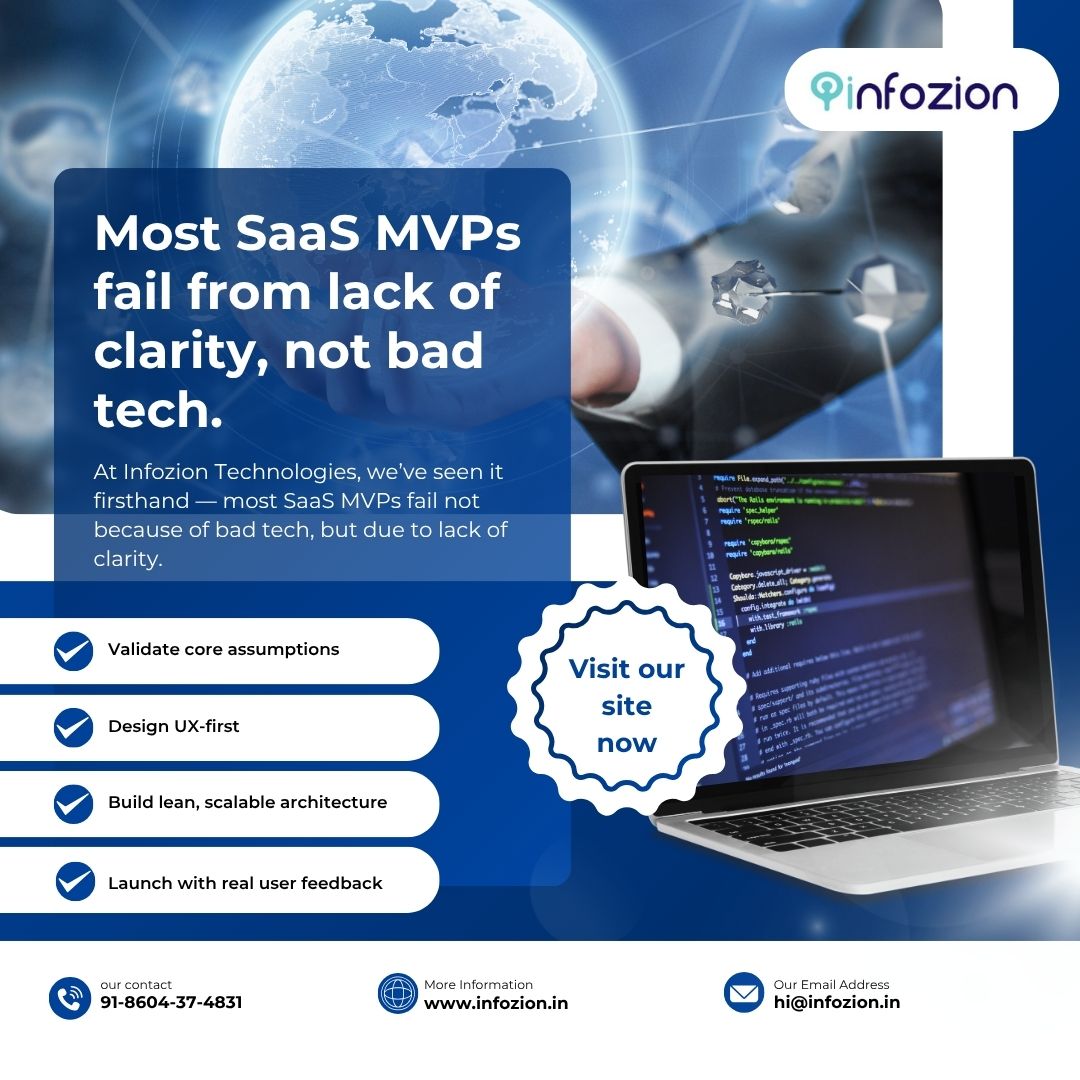SaaS Product Development for Startups: Our 100-Day Framework to MVP & Beyond

SaaS Product Development for Startups: Our 100-Day Framework to MVP & Beyond
SaaS Product Development for Startups: Our 100-Day Framework to MVP & Beyond
Starting a business is exciting. But SaaS product development for startups can feel hard. You might have a great idea, but turning it into something people can use is tricky. That’s where a smart plan helps.
In this blog, we’ll show you a simple 100-day framework. It helps you build your first product (an MVP) without wasting time or money. You’ll learn how to build, test, and grow your idea step by step.
Let’s break it down in a way that’s easy to understand.
What Is SaaS?
SaaS means Software as a Service. It’s software you can use online. You don’t need to download or install anything. You just log in and start using it.
Apps like Google Docs, Canva, and Zoom are SaaS products. They’re popular because they are simple and work from anywhere.
What Is an MVP?
An MVP is a Minimum Viable Product. It’s the first version of your software. It only has the most important features. It’s not perfect, but it works.
You build an MVP to test your idea. You learn what users like, what they need, and what you should improve. It saves time and helps you avoid building the wrong thing.
Why Small Start Is Smart in SaaS Product Development for Startups
Many startups try to build a full product from day one. They add too many features. They spend too much time and money. Then, they find out users don’t even need half of it.
That’s why starting small is better. You build something basic first. Then, you test it. And then you grow it.
Want to see how we do it? Here’s our proven MVP process.
Our 100-Day Framework: Step-by-Step
We’ve helped many startups go from idea to launch. Based on that, we built this 100-day plan. It helps you move fast and smart.
Phase 1: Discovery (Days 1–20)
This is where you learn. You don’t build anything yet. You talk to people. You try to understand the real problem.
You ask:
-
What does the user need?
-
What is the main pain point?
-
Is someone already solving this?
You also sketch ideas. You draw simple screens to see how the app might work.
This phase helps you get clear. So, you don’t waste time building the wrong thing.
Phase 2: Plan & Wireframe (Days 21–40)
Now, you plan your MVP.
You make a list of features. Only add the most important ones. Leave the extras for later.
Then, you create wireframes. These are like rough drawings. They show how each screen will look and work.
This helps you see your idea more clearly.
Phase 3: Design & Build (Days 41–80)
Next, you bring your idea to life.
Designers create the real screens. They choose colors, buttons, and layouts that look good and are easy to use.
Then developers write the code. They build your app, screen by screen. They also test it as they build.
This way, everything works smoothly.
Phase 4: Test & Improve (Days 81–90)
Your MVP is ready. Now it’s time to test it.
You give it to a few real users. Watch how they use it. Ask what they liked. Ask what was confusing.
Based on that, you fix bugs and improve your app.
Testing gives you confidence before launch.
Phase 5: Launch & Grow (Days 91–100)
Now, your product goes live. You share it with more people.
But don’t stop here.
You keep learning. You collect feedback. You add useful features one by one.
You grow slowly but surely.
Need help scaling your product after MVP? Visit Infozion Technologies to get expert support.
Why This 100-Day Framework Helps in SaaS Product Development
This plan works because it’s simple.
You don’t guess. You learn.
You don’t waste time. You focus.
You don’t overbuild. You improve slowly.
Many startups fail because they build too much, too soon. This plan keeps things lean and clear.
A Real-World Example of SaaS Product Development for Startups
Let’s say you want to build an app for teachers.
You want to help them track homework.
Here’s how your 100 days could go:
-
First, you talk to 10 teachers.
-
You learn they struggle with knowing who turned in homework.
-
So, you plan a simple tool that lets students upload homework.
-
You build that and test it in 2 schools.
-
Teachers love it. You launch it and slowly add more features.
That’s real growth. That’s smart SaaS.
Conclusion: Smarter SaaS Product Development for Startups
Building a SaaS product doesn’t have to be hard. With the right plan, you can go from idea to MVP in just 100 days.
Start small. Learn fast. Grow wisely.
If you’re serious about SaaS product development for startups, this 100-day roadmap can save you time, money, and effort.
Want to follow this plan? Check out our full guide here. Or connect with our team at Infozion Technologies. We’ll help you build your dream product — the right way.
In the fast-paced world of startups and innovation, getting your product to market quickly and efficiently is key to staying ahead. This is where MVP (Minimum Viable Product) Development Services come into play. MVP development focuses on creating a basic version of your product that fulfills core functionalities, allowing you to test your concept with minimal investment. It’s an agile approach to validating ideas, reducing risks, and gathering valuable user feedback.
How Much Does It Cost to Develop an MVP?
The cost of MVP development depends on several factors:
- Complexity of Features: Simple MVPs with basic functionality can cost between ₹8,00,000 and ₹24,00,000. More complex MVPs with advanced features may range from ₹40,00,000 to ₹80,00,000 or more.
- Development Team: Hiring freelancers may cost less, but professional development agencies offer a more structured approach. Agencies typically charge ₹4,000 to ₹16,000 per hour depending on their expertise.
- Technology Stack: The choice of programming language, frameworks, and integrations affects cost.
- Location of Developers: Costs vary significantly based on geography. For instance:
- US/Europe: ₹8000-₹16,000/hour
- India/Asia: ₹1,600-₹4,000/hour
- Timeframe: The quicker you need your MVP, the higher the cost due to additional resources.
Pro Tip:
Investing in an experienced MVP development company ensures a balance of quality, efficiency, and cost-effectiveness.
The cost of MVP development services depends on several factors:
- Complexity of Features: Simple MVPs with basic functionality can cost between 200000rs – 500000rs. More complex MVPs with advanced features may range from 800000rs – 15,00,000rs or more.
- Development Team: Hiring freelancers may cost less, but professional development agencies offer a more structured approach. Agencies typically charge $50 to $200 per hour depending on their expertise.
- Technology Stack: The choice of programming language, frameworks, and integrations affects cost.
- Location of Developers: Costs vary significantly based on geography. For instance:
- US/Europe: $100-$200/hour
- India/Asia: $20-$50/hour
- Timeframe: The quicker you need your MVP, the higher the cost due to additional resources.
Pro Tip:
Investing in an experienced MVP development company ensures a balance of quality, efficiency, and cost-effectiveness.
A Look at Our MVP Development Process
At Infozion, we follow a well-structured process to deliver high-quality MVPs:
- Discovery Phase:
- Market Research: Understand the market landscape and target audience.
- Requirement Analysis: Identify essential features and define a clear scope.
- Prototyping and wireframing:
- Create visual prototypes to map out user flows and interfaces.
- Validate the design concept with stakeholders.
- Development Phase:
- Choose the right technology stack.
- Develop core functionalities based on priority.
- Testing and Feedback:
- Perform usability and functionality tests.
- Gather user feedback for iterative improvements.
- Launch and Support:
- Deploy the MVP to the market.
- Provide post-launch support and enhancements based on user insights.
Timeline for MVP Development
An average MVP development project takes 4 to 12 weeks, depending on complexity and scope.
Benefits of MVP Development Services
MVP development offers numerous advantages for startups and businesses:
1. Risk Mitigation:
- Test your idea in the market before committing to full-scale development.
- Identify potential flaws and rectify them early.
2. Cost Efficiency:
- Save resources by focusing on essential features first.
- Avoid investing in features that may not resonate with users.
3. Faster Time to Market:
- Launch your product quickly to capture market attention.
- Stay ahead of competitors by being the first mover.
4. User-Centric Approach:
- Gather real user feedback to refine and improve the product.
- Ensure the final product aligns with customer expectations.
5. Scalability:
- Build a foundation for adding features incrementally as the product evolves.
- Adapt to changing market needs efficiently.
Why Infozion is the Perfect Partner for Your MVP Startup
1. Expertise Across Domains
Infozion has a proven track record of delivering successful MVPs across diverse industries, including healthcare, fintech, e-commerce, and more.
2. Agile Development Methodology
We prioritize flexibility and adaptability, ensuring your MVP evolves with your needs and market trends.
3. Transparent Pricing
Our value-effective solutions are tailored to your budget without compromising on quality.
4. Experienced Team
Our team comprises experienced developers, designers, and strategists who are dedicated to your success.
5. Post-Launch Support
We offer robust post-launch support to ensure your product continues to thrive and grow.
Real-Life Success Stories with Infozion
Case Study: Supply chain MVP
- Challenge: A startup wanted to create a digital wallet with unique features.
- Solution: Infozion developed a user-friendly MVP within 4 months.
- Results: The startup secured $1.5 million in funding post-launch and scaled rapidly.
FAQs About MVP Development
Q1. What industries benefit most from MVP development?
Industries like technology, healthcare, education, and retail benefit greatly from MVPs due to their dynamic nature and need for user-driven innovation.
Q2. Can MVP development be done for mobile apps?
Yes, mobile app MVPs are highly popular. They allow businesses to test core functionalities before scaling up.
Q3. How do I choose the right MVP development company?
Look for:
- Proven experience in MVP development.
- Positive client reviews and case studies.
- Transparent pricing and timelines.
- Ongoing support services.





